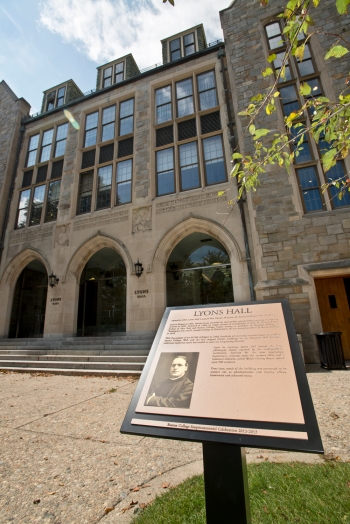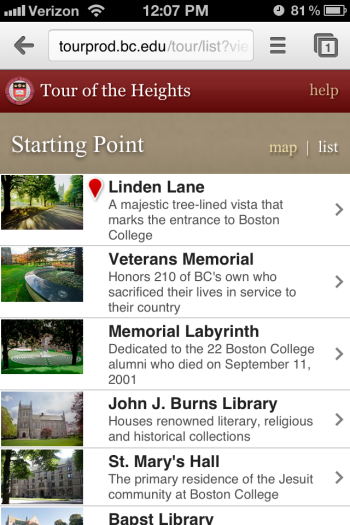
By
To facilitate self-guided tours of campus and provide a better understanding of the University’s historical and cultural landmarks, Boston College will unveil 13 historical markers and a GPS-navigated campus tour app and mobile website to coincide with the launch of the Sesquicentennial Celebration on Sept. 15.
Seven of the historical markers, which will be placed in front of the University’s oldest buildings, will provide biographical information on the individuals after whom the buildings are named — from Jesuit Presidents Gasson and Bapst to Lyons and Fulton — as well as the buildings’ past and current uses. The remaining markers will provide information on prominent campus sites, ranging from Alumni Stadium to the Campus Green.
The historical markers project was conceived by the Office of News & Public Affairs in conjunction with the late University Historian Thomas H. O’Connor, who had written narratives that described the buildings and their namesakes.
In anticipation of the Sesquicentennial Celebration, News & Public Affairs Director Jack Dunn approached University President William P. Leahy, SJ, and the Sesquicentennial Steering Committee with the idea of turning his depictions into historical markers. With the president’s approval, the University hired campus architects Stephen Stimson Associates, which produced the bronze-plated markers in time for the Sesquicentennial kickoff.
The campus markers include Gasson, St. Mary’s, Devlin, Fulton and Lyons halls, Bapst, Burns and O’Neill libraries, Linden Lane, the Campus Green, Conte Forum, the Lowell Lecture Series and Alumni Stadium.
“This project is a tribute to Tom O’Connor, whose poignant descriptions of the University’s historic buildings and prominent sites will provide a lasting resource that will benefit all who visit our campus,” said Dunn.
To meet the longstanding need of providing a mobile tour of campus, the University has also launched a campus tour cross-platform app and mobile website called “Tour of the Heights,” which provides text, video, audio and still photos of these 13 historical sites and 15 additional campus sites of interest. Accessible through smart phones, or virtually through the web, the “Tour of the Heights” guides visitors through the BC campus and provides multimedia information on prominent sites ranging from the St. Ignatius and Flutie statues to the Veterans Memorial and the Higgins Stairs.

The “Tour of the Heights” app and mobile website include the voice talents of BC faculty and administrators, ranging from English Professor Carlo Rotella and Vice President William Neenan, SJ, to Rattigan Professor of English Emeritus John Mahoney and Men’s Hockey Coach Jerry York, as well as several BC students who auditioned for the role.
Funded by the Office of the President for the Sesquicentennial, the app — available for free download later this month through the Apple Store and accessible through www.bc.edu/tour — was created by the Office of News & Public Affairs, BC ITS Web Technology Group and Modo Labs of Cambridge.
Dunn said his staff worked on the project for more than a year and incorporated new video, photos and interviews with existing footage from Media Technology Services (which did audio recordings), the Office of Marketing Communications and University Archives. He praised News & Public Affairs staffer Melissa Beecher as the project director whose efforts enabled the app to be completed in time for the Sesquicentennial launch.
“Thanks especially to Melissa, and the News & Public Affairs staff, as well as Scott Olivieri and Kul Thapa from ITS, this ‘Tour of the Heights’ app and mobile website will greatly enhance the visitor experience for prospective students and returning alumni by providing a multimedia tour of Boston College that can now be accessed from any point on campus, or from the comfort of their own homes,” said Dunn.
“This is a wonderful resource that will be a highlight of the Sesquicentennial Celebration,” said McIntyre Professor of Economics and Sesquicentennial Steering Committee member Joseph Quinn. “It will benefit admissions, faculty recruiting, alumni relations and community relations, while providing a better understanding for all who visit of the rich history of the Boston College campus.”



